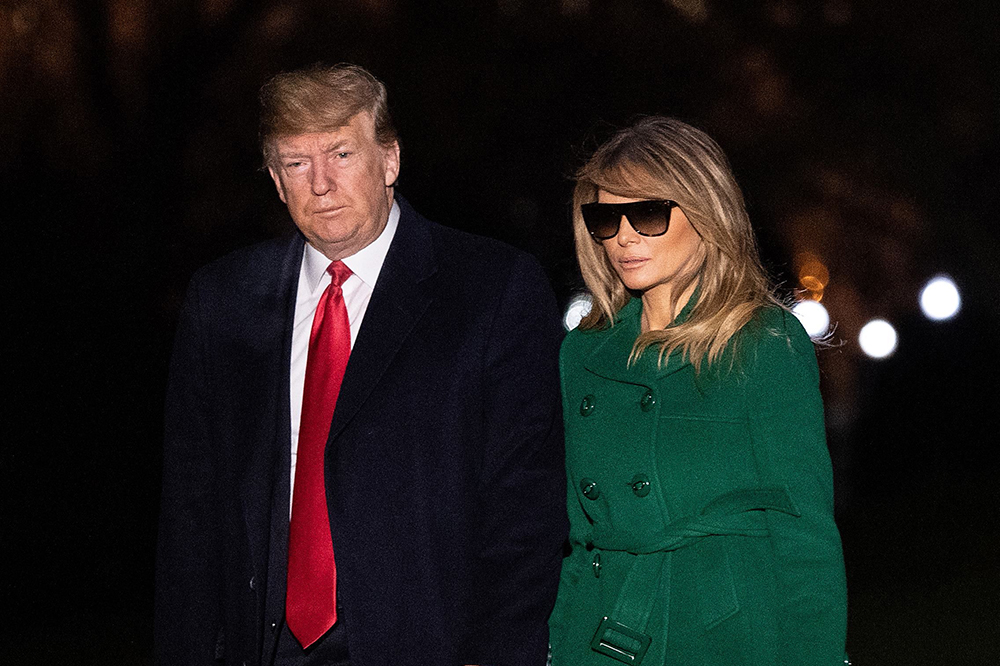On Christmas Eve, President Trump spoke to a seven-year-old girl called Collman Lloyd. ‘Are you still a believer in Santa?’ he asked her, ‘coz at seven, it’s marginal, right?’ Perfect. Pure Trump. It was OK, though. Later, little Collman told reporters that she still believed, despite what the leader of the free world had said to her. Trump didn’t manage to shake a seven-year-old’s faith in Santa. But, in another surprise declaration over Christmas, he announced that American troops would be leaving Syria. It happened ‘very fast,’ as Trump likes to say. He took a call from the Turkish leader, President Erdogan. According to an account of this conversation given to me, Erdogan told him the Turkish Army were going to roll into territory held by the Kurds and the Americans had better get out of the way. Fine by me, Trump said, or words to that effect: we’ll leave right away, we wanted to anyway. It seems that Erdogan wasn’t ready to move quite so quickly and backpedalled. That was on a Monday. The withdrawal announcement was made on Wednesday of that week. Inevitably, Trump did it on Twitter. This was how the American troops fighting in Syria, and the Kurds alongside them, learned of the decision. Trump tweeted: ‘We have defeated Isis in Syria, my only reason for being there…’
We have defeated ISIS in Syria, my only reason for being there during the Trump Presidency.
— Donald J. Trump (@realDonaldTrump) December 19, 2018
As the Kurdish military pointed out, Isis is cornered but not yet defeated. They are trapped – along with as many as 100,000 civilians – in a handful of villages near Syria’s border with Iraq. A Kurdish statement said Trump’s decision would give the Islamic State the chance to ‘recover again’ and, in fact, they are reported to have clawed back a little bit of territory in the latest fighting. Answering the Kurds and his own Secretary of Defense – who had resigned in protest – Trump tweeted: ‘Does the USA want to be the Policeman of the Middle East, getting NOTHING but spending precious lives and trillions of dollars protecting others who, in almost all cases, do not appreciate what we are doing?’
Does the USA want to be the Policeman of the Middle East, getting NOTHING but spending precious lives and trillions of dollars protecting others who, in almost all cases, do not appreciate what we are doing? Do we want to be there forever? Time for others to finally fight…..
— Donald J. Trump (@realDonaldTrump) December 20, 2018
The Kurds always say they have ‘no friends but the mountains’. This bitter proverb stems, they will tell you, from a long history of betrayal followed by persecution. They were promised their own state after the first world war and the break-up of the Ottoman Empire. Instead, the Great Powers cut them into four and gave a piece each to Turkey, Syria, Iran and Iraq. History seemed to give them another chance with the outbreak of the Syrian civil war and the rise and then the destruction of the Isis ‘caliphate’, but the Kurds were always waiting for the next ‘betrayal’. This time, it came by tweet. To be fair to the US, the Kurds were never promised a state, only help in destroying Isis. The Kurds just assumed the Americans would be around for longer. Now they have to choose between rule by Turkey and rule by the Syrian regime of Bashar al Assad.
They will try to choose the regime as the lesser of two evils. I heard one story that illustrates the harsh, new realities for the Kurds. They sent a delegation to talk terms with Ali Mamlouk, the head of Syria’s domestic security and intelligence agencies. When they arrived, two Iranian officials were there instead of Mamlouk. The Iranians are said to have told them: This is not a negotiation, you will surrender all your checkpoints, hand over your weapons, and fly the Syrian flag over every Kurdish town. After that, maybe, we can talk about what the Kurds want. The delegation left, thinking this was an Iranian power play. They tried again and this time sat down with Mamlouk. He apparently told them: The Iranian deal is the best you’ll get.
President Trump, so concerned about Iran, seems content to leave the Iranians in charge of Syria (along with Russia. Trump’s enemies will see the explanation of his announcement there). But the simple truth is that the regime has not only survived the civil war, it has won. Trump’s critics were wrong to say that America’s withdrawal will hand victory to Assad. Victory was already in his grasp. And had the US stayed in Syria, it would have made little difference to the outcome. There were only a small number of American troops and, anyway, the Kurdish-held areas are mostly empty desert, a long way from the major cities.
Still, a friend, a political consultant who’s been in Washington for decades, told me he thought Trump’s decision would have far reaching consequences. And not only in the Middle East. He sent me a startling text: ‘I’m thinking of JFK’s assassination: the hatred of those left to die on the beaches. Think of the hatred that will be provoked by the Turks’ destruction of the Kurds.’ He was making a comparison with the Bay of Pigs and Kennedy’s order to cancel bombing in support of the Cuban ‘patriots’ who had landed on the beaches there. Seymour Hersh writes in his brilliant (but flawed) book The Dark Side of Camelot: ‘Kennedy’s refusal to go forward with the essential bombing mission – or, for that matter, simply to call off the exile invasion – was not a military but a political decision. As Kennedy had to know, his decision amounted to a death sentence for the Cuban exiles fighting on the ground.’ For those Americans who do not believe that Lee Harvey Oswald acted alone, one of the conspiracy theories of Kennedy’s assassination is that Cuban exiles were somehow involved, and even CIA veterans of the Bay of Pigs. My friend texted: ‘The real Deep State is at DoD [the Department of Defense], the younger ones that have been in the trenches with the Kurds.’
My friend is a Democrat but some Trump loyalists firmly believe that the ‘Deep State’ may – or will – try to assassinate the President. Alex Jones was pushing this theory on the day of the inauguration on Infowars, his website, which is popular with Trump’s base. The former Infowars Washington bureau chief, Jerome Corsi, wrote a book arguing that ‘the globalists in the Deep State’ have decided to remove Trump ‘one way or the other’. Dr Corsi is now a Grand Jury witness for the Mueller investigation. But that experience has only strengthened his belief that Trump faces an enemy within. ‘Should the Deep State fail to remove Trump from office through impeachment or a charge under the 25th Amendment that he is mentally incompetent, “executive action”—a CIA plan to assassinate Trump—is the Deep State’s last resort.’ (The Spectator will interview Dr Corsi next week.)
Conspiracy world is where some Trump supporters live: QAnon, Infowars, and occasionally Fox. Trump traded on this in the campaign – asking if Ted Cruz’s father helped to assassinate Kennedy – and so did the Russian bots that planted fake news stories on Twitter and Facebook. For a long time, though, it has not been fantastical to ask if President Trump will be impeached. Elizabeth Drew wrote a good book about covering Watergate and is one of the most perceptive commentators on the current crisis. She believes impeachment is now ‘inescapable’. She writes in the New York Times: ‘It always seemed to me…that key Republicans would eventually decide that he had become too great a burden to the party or too great a danger to the country. That time may have arrived. In the end the Republicans will opt for their own political survival.’
If President Trump is impeached, would he accept the outcome and leave quietly for the golf course or the federal penitentiary? The Spectator has previously pointed out that Trump could declare a state of emergency or martial law – if someone informs him of a modern president’s many powers. The statutes granting those powers – 123 of them – have been listed by NYU’s law school and are the subject of an Atlantic cover story this month. This is a president who threatened not to accept the election result when he thought he had lost. He has an acting attorney general who doesn’t agree with Marbury v. Madison, the Supreme Court’s ruling in 1803 that confirms it as the final arbiter in any dispute between Congress and the President over the meaning of the Constitution. My friend, the veteran political consultant, texted me: ‘I am convinced he will be gone but like Nero will burn much of the capital before he leaves. There is real global danger [too]. He is mad and insiders have known this since the start.’
Impeachment. The 25th Amendment. Martial law. Tanks on the White House lawn. A taut, humming wire connecting bloodshed and ‘betrayal’ in Syria with a violent end to the Trump presidency. You might see all this as pure fantasy. Or you could see this as the wilder end of the spectrum of possibilities in Trump’s personal war with his intelligence agencies. Or just as a symptom of the feverish atmosphere in Trump’s Washington: people are actually thinking – and saying – these things. As the new Democratic House of Representatives prepares to be sworn in, the political class in Washington wonder: just how crazy are things going to get around here?


















